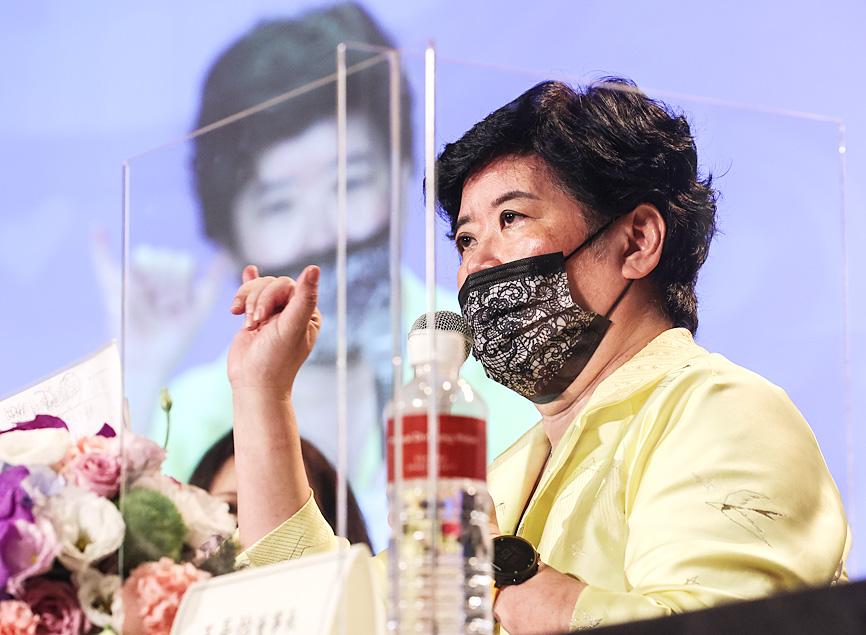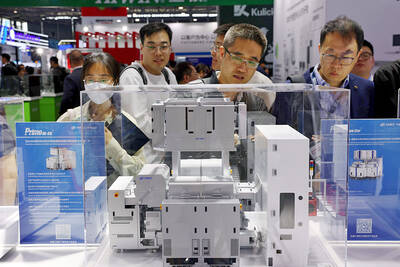United Biomedical Inc Asia (聯亞生技) on Sunday urged the government to give its COVID-19 vaccine candidate, UB-612, a second chance, after its application for emergency use authorization (EUA) was denied last week.
Company founder Wang Chang-yi (王長怡) said that the Food and Drug Administration’s (FDA) standards for granting an EUA were hastily devised and outdated.
In assessing the effectiveness of a vaccine candidate, the FDA only considers the virus neutralizing antibodies — expressed as geometric mean titers (GMTs) — but the reaction of T-cells should also be part of the equation, Wang said.

Photo: CNA
The FDA should compare the effectiveness of the UB-612 vaccine and the AstraZeneca vaccine against the Delta variant of SARS-CoV-2, given that the variant is the most contagious, she said.
“It would be deeply regrettable to deny people access to such a good vaccine because of hastily devised EUA standards,” Wang said.
Despite the setback, the firm remains committed to seeking international approval for its COVID-19 vaccine candidate, she said.
United Biomedical said that it would soon appeal the FDA’s decision not to grant an EUA for the UB-612 vaccine.
The FDA respects the company’s right to appeal, it said, adding that it would review the application and decide whether another meeting of experts would be necessary.
On Monday last week, the FDA said that a majority of the experts had on Sunday voted not to grant the company an EUA.
To be granted an EUA, a vaccine must have a seroconversion rate of more than 50 percent, with GMTs at least equal to two-thirds of the level found in recipients of the AstraZeneca vaccine.
The FDA decided to test the antibody concentrations against people who had been inoculated with the AstraZeneca vaccine, because there is no globally recognized method for measuring GMTs or an accepted standard for what GMT level indicates effective protection.
The interim results of the company’s phase 2 clinical trials, released in late June, show that participants in the 19 to 64 age group had a seroconversion rate of 95.65 percent, meaning that 95.65 percent of participants produced neutralizing antibodies.
At the time, the company said that the GMT level was 102.3, while the GMT level of the AstraZeneca vaccine was 187.9, according to the FDA.
The comany had said that it would continue its phase 2 clinical trials in Taiwan and that its parent company, United Biomedical Inc, would re-evaluate the benefits of conducting phase 3 clinical trials.
At Sunday’s news conference, Wang did not say whether the company was proceeding with its plan to begin phase 2/3 efficacy trials in India, which were expected to have 11,000 participants.
The company would conduct phase 3 clinical trials in India for its “next-generation” COVID-19 vaccine, named “UB-613,” she said, without elaborating.

With this year’s Semicon Taiwan trade show set to kick off on Wednesday, market attention has turned to the mass production of advanced packaging technologies and capacity expansion in Taiwan and the US. With traditional scaling reaching physical limits, heterogeneous integration and packaging technologies have emerged as key solutions. Surging demand for artificial intelligence (AI), high-performance computing (HPC) and high-bandwidth memory (HBM) chips has put technologies such as chip-on-wafer-on-substrate (CoWoS), integrated fan-out (InFO), system on integrated chips (SoIC), 3D IC and fan-out panel-level packaging (FOPLP) at the center of semiconductor innovation, making them a major focus at this year’s trade show, according

DEBUT: The trade show is to feature 17 national pavilions, a new high for the event, including from Canada, Costa Rica, Lithuania, Sweden and Vietnam for the first time The Semicon Taiwan trade show, which opens on Wednesday, is expected to see a new high in the number of exhibitors and visitors from around the world, said its organizer, SEMI, which has described the annual event as the “Olympics of the semiconductor industry.” SEMI, which represents companies in the electronics manufacturing and design supply chain, and touts the annual exhibition as the most influential semiconductor trade show in the world, said more than 1,200 enterprises from 56 countries are to showcase their innovations across more than 4,100 booths, and that the event could attract 100,000 visitors. This year’s event features 17

Germany is to establish its first-ever national pavilion at Semicon Taiwan, which starts tomorrow in Taipei, as the country looks to raise its profile and deepen semiconductor ties with Taiwan as global chip demand accelerates. Martin Mayer, a semiconductor investment expert at Germany Trade & Invest (GTAI), Germany’s international economic promotion agency, said before leaving for Taiwan that the nation is a crucial partner in developing Germany’s semiconductor ecosystem. Germany’s debut at the international semiconductor exhibition in Taipei aims to “show presence” and signal its commitment to semiconductors, while building trust with Taiwanese companies, government and industry associations, he said. “The best outcome

Semiconductor equipment billings in Taiwan are expected to double this year, as manufacturers in the industry are keen to expand production to meet strong global demand for artificial intelligence applications, according to SEMI, which represents companies in the electronics manufacturing and design supply chain. Speaking at a news conference before the opening of Semicon Taiwan trade show tomorrow, SEMI director of industry research and statistics Clark Tseng (曾瑞榆) said semiconductor equipment billings in Taiwan are expected to grow by an annual 100 percent this year, beating an earlier estimate of 70 percent growth. He said that Taiwan received a boost from a